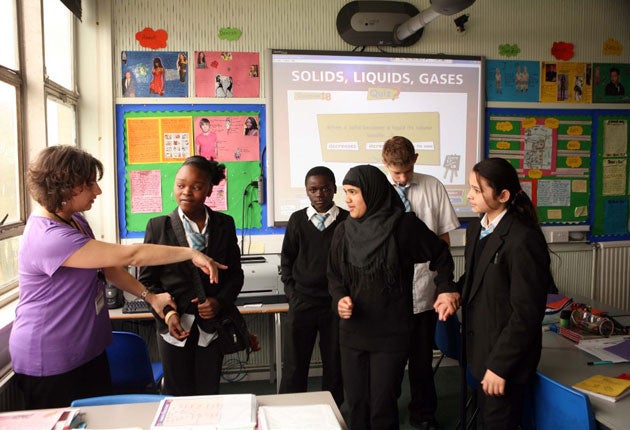School's 64 languages - and one voice
Multi-lingual London school reverts to sending letters to parents in English

Only a week ago MPs expressed concerns that one in seven children in the UK does not speak English at home. Schools are struggling to cope with this, they argued.
At Woodside High, a 1,000-pupil comprehensive in Tottenham, north London, those whose home language is not English account for four out of five pupils – and between them speak 64 languages.
Hardly a week goes by at Woodside without teachers finding one or two more pupils arriving at their gates with hardly a word of the Queen's own. Last year there were 119 additions to the pupil roll during terms.
Headteacher Joan McVittie said: "The thing about the one-in-seven figure is that you're going to get tremendous variation across the country.
"In some schools it could be just one or two pupils. In urban schools like ours, it can be 80 per cent."
The school has developed quite an expertise in dealing with the situation. It has tried to ensure its staff profile mirrors, as far as possible, the languages spoken by pupils.
Many of those hired recently are, for example, fluent in several languages.
Cali Habbad, head of the programme to teach English to new arrivals, modestly admits to speaking five languages. His colleagues insist it is more. Other teachers reflect the ethnic origin of the pupils.
The school has also moved away from a previous plan to send notes home with pupils in the relevant foreign language.
If a parent has trouble understanding notes written in English, says Mr Habbad, they can come into school where they will be given help with translation.
That way parents can be helped to learn English as well as pupils.
Woodside has also dropped a plan to teach Turkish pupils maths in their native language because it found that, as a result, they did not make so much progress in English.
In addition, every child arriving at the school with little English is given a "buddy" they can sit next to in class who helps them when they are struggling and shows them around the school.
It would be wrong to pretend there are no problems caused by this mix at Woodside High. For example, some years ago there were fights between members of the two biggest ethnic minority groups – Turkish and Somali – often on the way home from school.
The school's answer has been to train older pupils in mediation, so they can step in and prevent conflict.
"We've done this for the Year 10s (the year before GCSE) because we thought the following year they would be too busy with their exams," said Mrs McVittie.
Head boy Arez Mohamed, 16, sees this as one of his responsibilities.
"You have to lead by example," he said. "You deal with stressful situations if there are fights or arguments. You calm people down."
He has even trained in martial arts – although Mrs McVittie stresses this is on his own initiative, and not that of the school. The result of the mediation scheme is that there are no longer fights between rival groups – only the odd playground scuffle perhaps between two pupils.
The local council, Haringey, insists any incident of a racial nature is recorded, but Mrs McVittie can't recall the last time she had to fill in such a form.
The proof of these initiatives, it would seem, is in the results. Not only is the school a calmer place from a behavioural point of view, but its exam results have soared. This year, between 35 and 40 per cent of GCSE pupils are expected to get five passes with grades of between A*and C including maths and English – compared with just 11 per cent four years ago.
Say what?
*Native languages spoken by pupils:
Akan,
Albanian,
Amharic,
Arabic,
Bengali,
Bengali (Sylheti),
Bosnian,
Bulgarian,
Creole French,
Chinese,
Croatian,
Czech,
Dutch,
English,
Farsi,
Filipino,
Flemish,
French,
Greek,
Hungarian,
Igbo,
Italian,
Kiswahili,
Kurdish,
Lingala,
Lithuanian,
Luganda,
Panjabi,
Pakhto,
Pashto,
Persian,
Polish,
Portuguese,
Romanian,
Russian,
Serbian,
Shqip,
Somali,
Spanish,
Swahili,
Tagalog,
Turkish,
Twi-Fante,
Urdu,
Vietnamese,
Wolof,
Yoruba.
(Other languages at the school are different dialects of the above.)
Subscribe to Independent Premium to bookmark this article
Want to bookmark your favourite articles and stories to read or reference later? Start your Independent Premium subscription today.

Join our commenting forum
Join thought-provoking conversations, follow other Independent readers and see their replies